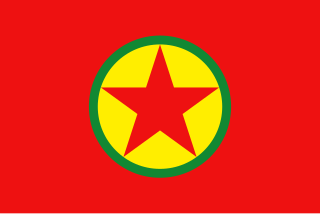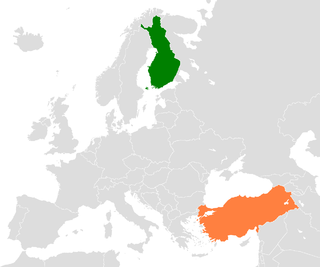
The Kurdistan Workers' Party or PKK is a Kurdish militant political organization and armed guerrilla movement which historically operated throughout Kurdistan but is now primarily based in the mountainous Kurdish-majority regions of southeastern Turkey and northern Iraq. It was founded in Ziyaret, Lice on 27 November 1978 and has been involved in asymmetric warfare in the Kurdish–Turkish conflict. Although the PKK initially sought an independent Kurdish state, in the 1990s its official platform changed to seeking autonomy and increased political and cultural rights for Kurds within Turkey.

Sulaiman Jassem Sulaiman Ali Abu Ghaith is a Kuwaiti regarded as one of al-Qaeda's spokesmen. He is married to one of Osama bin Laden's daughters. In 2013, Gaith was arrested in Jordan and extradited to the United States. In 2014, he was convicted in a U.S. federal court in New York for "conspiring to kill Americans and providing material support to terrorists" and sentenced to life imprisonment He is serving his sentence at the federal ADX Florence prison in Colorado.

Najmadin Faraj Ahmad, better known as Mullah Krekar, is a Kurdish Sunni Islamic scholar who was the founder and former leader of Ansar al-Islam. He is currently serving a prison sentence in Italy, after having been extradited from Norway in 2020. He came to Norway as a refugee from Iraqi Kurdistan in 1991. His wife, Rukhosh Ahmad, and his four children have Norwegian citizenship, but not Krekar himself. He speaks Kurdish, Arabic, Persian, Norwegian and English.
The European Arrest Warrant (EAW) is an arrest warrant valid throughout all member states of the European Union (EU). Once issued, it requires another member state to arrest and transfer a criminal suspect or sentenced person to the issuing state so that the person can be put on trial or complete a detention period. It is a simplified cross-border judicial surrender method, and has replaced the lengthy extradition procedures that used to exist between member states. The EAW has been in force since 1 January 2004 in all Member States.

The Kurdistan Free Life Party, or PJAK, is a Kurdish leftist anti-Islamic Republic of Iran armed militant group. It has waged an intermittent armed struggle since 2004 against the Iranian Government, seeking self-determination through some degree of autonomy for Kurds in Iran.

The Iran–PJAK conflict is an armed conflict between the Islamic Republic of Iran and Kurdish rebels of the Kurdistan Free Life Party (PJAK), which began in 2004. The group has carried out numerous attacks in the Kurdistan Province of Iran and provinces of Western Iran. PJAK is closely affiliated with the militant Kurdistan Workers' Party (PKK), the primary opponent of the Republic of Turkey in the Kurdish–Turkish conflict. PJAK has been designated as a terrorist organization by Iran, Japan, Turkey, and the United States.

Finland–Turkey relations are foreign relations between Finland and Turkey. Finland has an embassy in Ankara and an honorary consulate general in Istanbul. Turkey has an embassy in Helsinki. Both countries are full members of the Council of Europe, the Organisation for Economic Co-operation and Development (OECD), the Organization for Security and Co-operation in Europe (OSCE), North Atlantic Treaty Organization (NATO), and the Union for the Mediterranean. Finland is an EU member and Turkey is an EU candidate. Finland supports Turkey's accession to the EU. Turkey did not support Finland's accession to NATO until March 2023, but accepted its participation.

The Kurdistan Communities Union is a Kurdish political organization committed to implementing Abdullah Öcalan's ideology of democratic confederalism. The KCK also serves as an umbrella group for several confederalist political parties of Kurdistan, including the Kurdish militant political organization and armed guerrilla movement Kurdistan Workers' Party (PKK), Democratic Union Party (PYD), Kurdistan Free Life Party (PJAK), and Kurdistan Democratic Solution Party (PÇDK). Finland and Sweden's alleged support for the KCK, is one of the points which caused Turkey to oppose Finland and Sweden's NATO accession bid.
2011 Iran–Iraq cross-border raids were a series of operations, performed by Iran's Islamic Revolutionary Guard Corps (IRGC), against the Kurdistan Free Life Party (PJAK), a Kurdish rebel group. The operations began in July 2011, and included attacks on PJAK bases in Iranian territory, penetration into Iraqi Kurdistan territory, bombing of PJAK associated bases and villages in Kurdish controlled Iraqi areas and direct targeting of Kurdish guerrilla command in Qandil mountains. The clashes resulted in dozens killed and wounded on both sides, with hundreds of displaced Kurdish villagers. The exact numbers of casualties on each side are a matter of controversy.
Mustafa Karasu also known as Huseyin Ali is a deputy chairman Turkish founder of the Kurdistan Workers' Party (PKK), a Kurdish rebel group fighting an armed insurgency against the government of Turkey for an independent Kurdistan. The group is recognised as a terrorist organisation by Turkey, the United States and EU.
2007 West Azerbaijan clashes were a series of armed clashes between Iranian security forces and the Kurdish insurgent group PJAK in Iran's West Azerbaijan province. It started with a series of clashes between Iran and the PKK, leading to the death of 17 PKK militants between February 22 and February 24 by Iranian forces. This was followed by an Iranian helicopter crash in Khoy, an incident which was claimed to be performed by PJAK, though denied by Iranians as technical malfunction. The Iranian military launched an offensive the next day which resulted in the death of 47 insurgents and 17 security forces and lasted until March 1.
Majid Kavian, also known as Semko Sarheldan was the deputy commander of the militant Kurdistan Free Life Party (PJAK) until his death on 3 September 2011, at the age of 29. As the number two in command he was the chief commander of all PJAK's armed activities as the PJAK's number one leader, Abdul Rahman Haji Ahmadi lives in exile, in Germany.

Kurdish separatism in Iran or the Kurdish–Iranian conflict is an ongoing, long-running, separatist dispute between the Kurdish opposition in Western Iran and the governments of Iran, lasting since the emergence of Reza Shah Pahlavi in 1918.
The insurgency by the Kurdish Democratic Party of Iran surged in 1989, lasting until 1996, as part of the Kurdish separatism struggle. The eruption of the conflict in July 1989 was caused by the assassination of KDPI leader Abdul Rahman Qassemlou by suspected Iranian government agents. The most violent episodes took place in 1990 and 1991, when Kurdish soldiers launched massive attacks on Iranian military bases in Kurdish areas of Iran. This brought heavy retaliation from the Iranian government, aiming to eradicate the KDPI leadership by assassinating Sadegh Sharafkandi and other KDPI leaders in 1992 in order to disable the Kurdish party's ability to function. The conflict faded with the effective targeted assassination policy of Iran and by 1996 KDPI was no longer able to function militarily and announced a unilateral ceasefire. The conflict claimed hundreds of lives, mostly Iranian government troops and Kurdish militants.

Rawti Shax was a Kurdish cyberterrorist offshoot of the jihadist group Ansar al-Islam.
2016–present clashes in West Iran refers to the ongoing military clashes between Kurdish insurgent party Democratic Party of Iranian Kurdistan (PDKI) and the Iranian Revolutionary Guards, which began in April 2016. Kurdistan Freedom Party (PAK) and Komalah expressed their support to the Kurdish cause of PDKI as well, with both clashing with Iranian security forces in 2016 and 2017 respectively. In parallel, a leftist Iranian Kurdish rebel group PJAK resumed military activities against Iran in 2016, following a long period of stalemate.
Since 2016, the government of Turkey has conducted a series of purges, enabled by a state of emergency in reaction to the failed coup attempt on 15 July that year. The purges began with the arrest of Turkish Armed Forces personnel reportedly linked to the coup attempt but arrests were expanded to include other elements of the Turkish military, as well as civil servants and private citizens. These later actions reflected a power struggle between secularist and Islamist political elites in Turkey, affected people who were not active in nor aware of the coup, but who the government claimed were connected with the Gülen movement, an opposition group which the government blamed for the coup. Possession of books authored by Gülen was considered valid evidence of such a connection and cause for arrest.
Iranian Kurdistan or Eastern Kurdistan is an unofficial name for the parts of northwestern Iran with either a majority or sizable population of Kurds. Geographically, it includes the West Azerbaijan province, Kurdistan province, Kermanshah province, Ilam province and parts of Hamadan province and Lorestan province.

There are several separatist movements in Iran, most of which are associated with a particular minority ethnic group. Iran is a highly diverse country: in 2015, it was estimated that Persians―Iran's dominant ethnic group―only made up about 61% of the Iranian population.









